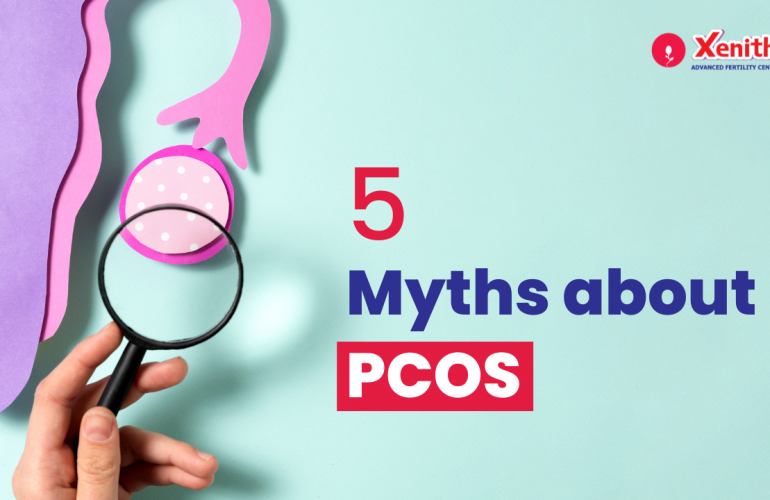Polycystic Ovary Syndrome (PCOS) is a hormonal disorder that affects up to 1 in 10 women of reproductive age. It is one of the most common causes of infertility, but the good news is that many women with PCOS can still conceive with the right treatment and lifestyle adjustments. If you are wondering how to conceive faster with PCOS, it’s crucial to understand the symptoms, causes, and available treatments that can increase your chances of pregnancy.
Understanding PCOS and Its Impact on Fertility
PCOS is primarily characterized by an imbalance in reproductive hormones, which can cause irregular ovulation, anovulation (lack of ovulation), and cysts on the ovaries. This hormonal imbalance can make it difficult for women to conceive, as regular ovulation is essential for pregnancy. However, women with PCOS can get pregnant, and understanding how to manage the condition can significantly improve your fertility.
Common Symptoms of PCOS
How do you know if you have PCOS? Here are some common symptoms that may signal PCOS:
- Irregular or missed menstrual periods: This is often the most obvious sign, as women with PCOS may experience infrequent or absent periods.
- Excessive facial or body hair: An increase in androgens (male hormones) can lead to hirsutism, where women may notice unwanted hair growth, especially on the face, chest, and abdomen.
- Acne or oily skin: Hormonal imbalances can also lead to acne outbreaks, especially along the jawline and chin.
- Thinning hair or male-pattern baldness: Women with PCOS may notice hair thinning, especially on the scalp.
- Weight gain and difficulty losing weight: Many women with PCOS experience unexplained weight gain and struggle to lose it due to insulin resistance.
- Infertility: Anovulation is a significant factor in infertility among women with PCOS.
While these symptoms can vary in severity, PCOS symptoms in pregnancy can also present unique challenges. Women with PCOS may face higher risks of gestational diabetes, preeclampsia, or preterm labor, so regular monitoring and care are essential.
How Can I Get Pregnant with PCOS Fast?
If you’re asking how can I get pregnant with PCOS fast, there are several strategies and treatments that can help you boost your fertility. Here are key steps to take when trying to conceive with PCOS:
1. Make Lifestyle Changes
Adopting a healthy lifestyle is the first step in managing PCOS and improving your fertility. For many women, making changes in diet and exercise can help regulate menstrual cycles and promote ovulation.
- Dietary Adjustments: A low-glycemic, balanced diet is crucial for managing insulin resistance, which is common in women with PCOS. Concentrate on eating a diet that includes whole grains, fruits, vegetables, lean proteins, and healthy fats. Limit processed sugars and refined carbs to help maintain stable blood sugar levels.
- Exercise Regularly: Moderate physical activity, such as walking, swimming, or yoga, can help improve insulin sensitivity and promote weight loss. At least 30 minutes of exercise on most days of the week will help you in many ways.
- Weight Loss: If you are overweight, losing even 5-10% of your body weight can help restore hormonal balance and improve your chances of ovulating regularly. Losing weight with PCOS can lead to more predictable menstrual cycles and enhance fertility.
2. Medications to Stimulate Ovulation
When lifestyle changes aren’t enough, fertility medications are often prescribed to help stimulate ovulation and regulate menstrual cycles.
- Clomifene Citrate (Clomid): Clomid is one of the most common first-line treatments for women with PCOS. It works by inducing ovulation and increasing the likelihood of pregnancy.
- Letrozole: Letrozole is another medication that helps stimulate the ovaries to release eggs. It is usually used as a substitute for Clomid in women with PCOS.
- Gonadotropins: For women who don’t respond to Clomid or Letrozole, injectable hormones (gonadotropins) can be used to stimulate the ovaries. These are typically used in more advanced fertility treatments like IUI (Intrauterine Insemination).
- Metformin: This medication is often prescribed to manage insulin resistance, a common issue in women with PCOS. Metformin can help regulate menstrual cycles and improve the effectiveness of other fertility treatments.
3. Intrauterine Insemination (IUI)
If ovulation is successfully induced with medication, your doctor may recommend IUI as an option. During IUI, sperm is directly inserted into the uterus around the time of ovulation, increasing the chances of sperm reaching the egg.
4. In Vitro Fertilization (IVF)
For women who do not respond to medications like Clomid or Letrozole, IVF may be the next step. IVF includes the process of stimulating the ovaries to generate several eggs, which are then collected and fertilized outside the body in a laboratory setting. The fertilized embryos are subsequently implanted in the uterus. IVF is a more invasive option but can be highly effective for women with severe PCOS-related infertility.
5. Laparoscopic Ovarian Drilling
This surgical option involves making small incisions in the abdomen to access the ovaries. A laser or electrosurgical needle is used to remove small sections of ovarian tissue, which can help restore hormonal balance and improve ovulation. This procedure is usually reserved for women who have not responded to other fertility treatments.
PCOS and Pregnancy Possibility: What You Should Know
It’s important to remember that PCOS with pregnancy possibility is very much a reality. While PCOS is a leading cause of infertility, many women with the condition do conceive, sometimes naturally, and other times with the help of fertility treatments. Early diagnosis and intervention are crucial for improving your chances of pregnancy.
If you’re struggling with PCOS-related infertility, consider consulting a fertility specialist at an advanced clinic like Xenith Advanced Fertility Clinic. Our team of experts can guide you through personalized treatment plans and help you understand how to conceive faster with PCOS.
Dealing with PCOS During Pregnancy
Women who conceive with PCOS may face a slightly higher risk of complications during pregnancy. Some PCOS symptoms in pregnancy to watch out for include:
- Gestational diabetes: PCOS increases the likelihood of developing gestational diabetes, which can lead to complications for both the mother and baby.
- Preterm birth: There is an increased risk of delivering prematurely in women with PCOS.
- Preeclampsia: High blood pressure and protein in the urine can indicate preeclampsia, which requires close monitoring.
While these risks exist, many women with PCOS have healthy pregnancies with appropriate prenatal care. Regular visits to your healthcare provider can help ensure both you and your baby remain healthy.
Final Thoughts: Can Women with PCOS Get Pregnant?
The answer is a resounding yes! Women with PCOS can get pregnant, but it often requires a combination of lifestyle changes, fertility treatments, and medical interventions. Early diagnosis and personalized care are essential for improving your chances of conceiving. If you have PCOS and are trying to conceive, how to conceive faster with PCOS is possible with the right support.
At Xenith Advanced Fertility Centre, we understand the unique challenges posed by PCOS and offer expert care to help you navigate your fertility journey. If you’re struggling with PCOS and infertility, we are here to help you achieve your dream of becoming a mother.
Don’t wait—schedule a consultation with our fertility specialists today and take the first step toward a successful pregnancy.
FAQs
1. Can I get pregnant with PCOS?
Yes, many women with PCOS can get pregnant. Although PCOS can cause irregular ovulation, with the right treatment, such as lifestyle changes, fertility medications, or more advanced treatments like IVF, the chances of conception can be significantly improved.
2. What lifestyle changes can help me conceive with PCOS?
To increase your chances of getting pregnant with PCOS, focus on maintaining a healthy weight, eating a balanced diet with whole grains, lean proteins, and healthy fats, and exercising regularly. Managing stress and ensuring you’re getting enough sleep can also be helpful in regulating hormones and improving fertility.
3. What treatments are available to help me conceive with PCOS?
Common treatments for conceiving with PCOS include fertility medications like Clomid or Letrozole, which stimulate ovulation. If needed, more advanced treatments such as Intrauterine Insemination (IUI) or In Vitro Fertilization (IVF) can be used to assist with conception. Your doctor will help determine the best course of action based on your individual situation.experience and expertise of our medical staff will put you at ease as we work with you to fulfill your dreams!




